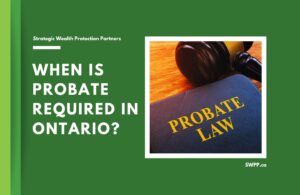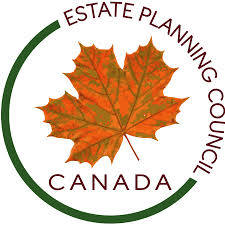Written by Ron Cooke, President & Founder of Strategic Wealth Protection Partners in Ontario, CEA®, Member of the Estate Planning Council Canada
Is there a Death Tax in Canada?
Many people worry about a “death tax” when planning their estate, but the good news is that Canada does not have an inheritance tax like the U.S. or U.K.
However, that doesn’t mean your estate is tax-free.
Capital gains tax, probate fees, and final income taxes can take a significant portion of your wealth if you don’t plan ahead. Understanding how these taxes work—and how to minimize them—can help ensure your family inherits more and pays less.

Summary of Key Points
- Trusts, gifting strategies, and joint ownership can minimize estate taxes.
- Life insurance is a smart way to cover capital gains tax and protect assets.
- A strong estate plan ensures your loved ones inherit more and avoid unnecessary legal fees.
Does Canada Have a Death Tax?
No, Canada does not have a death tax or inheritance tax.
This means your heirs won’t have to pay tax just for receiving an inheritance. However, when someone passes away, their estate must settle outstanding taxes before distributing assets. This includes capital gains tax, probate fees, and taxes on registered accounts like RRSPs/RRIFs.
These costs can be substantial, especially if you own real estate or have significant investments.
Proper estate planning can help reduce or eliminate unnecessary taxes, ensuring your wealth stays in the family.

How Are Your Assets Taxed Upon Death?
In Canada, when you pass away, the government treats your assets as if they were sold at fair market value on your date of death—this is called deemed disposition.
This can result in significant taxes. If your assets, such as real estate, stocks, or investments, have increased in value, 50% of the gain is taxable and added to your final tax return as capital gains tax.
Probate fees, known as the Estate Administration Tax in Ontario, may also apply if your estate goes through probate, with fees based on the total value of your estate.
Additionally, RRSPs and RRIFs that are not transferred to a spouse or dependent child are considered fully taxable income in the year of death. Without proper planning, your estate could owe hundreds of thousands in taxes, significantly reducing the inheritance your family receives.
How Can You Reduce or Avoid Estate Taxes in Canada?
You can reduce or defer estate taxes with smart planning. Consider some of the following options:
- Use the Principal Residence Exemption: This can eliminate capital gains tax on your family home.
- Set Up Joint Ownership: Certain assets can bypass probate by passing directly to a surviving owner.
- Name Beneficiaries on Registered Accounts & Life Insurance: This ensures RRSPs, RRIFs, and insurance payouts avoid probate.
- Use Gifting Strategies: Transferring assets to loved ones during your lifetime can reduce taxes at death.
- Create a Trust: Holding assets in a trust can provide tax advantages and control over asset distribution.
A well-structured estate plan ensures that your wealth is passed down efficiently with minimal tax loss.
Can Trusts Help Lower Estate Taxes?
Yes, trusts are one of the most effective tools for reducing estate taxes and protecting assets.
A properly structured trust can:
- Avoid probate: Assets in a trust are not part of your estate, meaning they won’t go through probate.
- Minimize capital gains tax: By spreading out ownership or using tax-efficient structures, you can reduce the tax burden.
- Control asset distribution: Trusts allow you to set conditions for how and when your heirs receive their inheritance.
- Protect assets from creditors & divorce: A trust ensures wealth stays within your family, safe from legal claims.
Trusts are especially useful for family cottages, investment properties, and business succession planning. Setting one up requires careful legal and financial planning, but the tax savings and protection they offer make them well worth considering.
How Can Life Insurance Be Used for Estate Planning?
Life insurance is a powerful tool for covering estate taxes and ensuring your loved ones don’t have to sell assets just to pay tax bills.
A permanent life insurance policy provides a tax-free payout that can be used to cover capital gains tax and probate fees, helping to preserve your estate. It also allows for a smooth transfer of wealth without forcing heirs to sell property or investments.
For families with multiple children, life insurance can help equalize inheritances if some receive real estate while others receive cash.
Additionally, it can be used to fund a family business succession plan, ensuring heirs don’t have to take on debt to keep the business running. Many high-net-worth families rely on life insurance as a cost-effective way to protect their legacy and ensure a seamless, tax-efficient wealth transfer.
Who Should I Work With If I Need to Do Estate Planning?
Estate planning is complex, and getting it right requires guidance from trusted professionals who specialize in minimizing taxes and protecting wealth.
- An Estate Planning & Tax Specialist: Helps design strategies to reduce capital gains tax, probate fees, and estate costs.
- A Lawyer: Drafts wills, trusts, and legal structures to ensure your estate plan is legally sound.
- A Financial Advisor: Helps structure your investments, life insurance, and retirement accounts for tax efficiency.
- An Accountant: Ensures your tax filings are optimized and estate strategies comply with CRA regulations.
With the right team of professionals, you can protect your assets, reduce taxes, and leave a lasting legacy for your family.
Final Thoughts
While Canada does not have a formal death tax, the combination of capital gains tax, probate fees, and RRSP/RRIF taxation can take a huge bite out of your estate if you don’t plan ahead.
Want to make sure your estate is structured properly? Let’s talk—a little planning today can save your family thousands tomorrow.
Discover How to Minimize Taxes and Secure Your Legacy
Did you know that without a solid estate plan, taxes and fees in Ontario could claim a significant portion of your wealth?
If you’ve worked hard to build your business, investments, and properties, protecting your legacy for your loved ones is critical. At Strategic Wealth Protection Partners, we specialize in helping high-net-worth individuals in Ontario secure their financial futures.
Our Living Estate Plan is designed to:
- Reduce estate taxes and probate fees.
- Simplify wealth transfer to your loved ones.
- Reflect your values and priorities in every detail.
Your Legacy Matters
With our personalized guidance, we’ll help you navigate options like Living Trusts to protect your assets and ensure your family’s peace of mind. Contact us today to book your Living Estate Plan Consultation and take the first step toward a secure future.
Schedule a Living Estate Plan Consultation
Planning your legacy is about more than numbers—it’s about ensuring your family remembers you and your values are honoured for many years to come.
Estate planning and trusts can feel overwhelming, especially if it’s your first time. That’s why we’re here.
With our simple, 5-Step Living Estate Plan, we make the process easy, helping you create a comprehensive estate plan or trust that protects your assets from taxes and probate fees while preserving your legacy. Tools like The Final Word Journal capture your story, wishes, and essential details like accounts and end-of-life plans, ensuring your family has clarity and comfort.
Take the first step today—schedule a consultation call and give your family the ultimate gift: peace of mind and the assurance they were always your priority.
Read More
If you’re starting your estate planning process, you may find these articles helpful:
- How to Avoid Inheritance Tax on a House in Canada
- How to Avoid Estate Tax in Canada
- How Much Is an Estate Taxed in Canada?
About the Author
RON COOKE, PRESIDENT & FOUNDER OF STRATEGIC WEALTH PROTECTION PARTNERS

With over 30 years in financial services, I’ve seen the challenges families face when a loved one passes—lost assets, unnecessary taxes, and emotional stress. That’s why I created the Living Estate Plan, a comprehensive process to protect assets, eliminate estate and probate fees, and create legacies that are remembered for many years to come.
This plan ensures your family receives not just your wealth, but a meaningful reminder of your care and love. Tools like The Final Word Journal capture your story, wishes, and essential details, offering clarity and comfort during difficult times.
Your final gift should be more than money—it should be peace of mind, cherished memories, and an organized estate.
Schedule a Call
Schedule a 30-minute consultation call with Strategic Wealth Protection Partners.
Click HERE to schedule a consultation.









